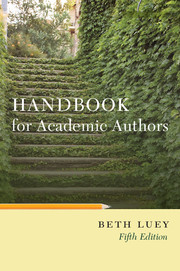Book contents
- Frontmatter
- Contents
- Illustrations
- Preface to the Fifth Edition
- Preface to the Fourth Edition
- Preface to the Third Edition
- Preface to the Second Edition
- Preface to the First Edition
- Chapter 1 The Publishing Partnership
- Chapter 2 Journal Articles
- Chapter 3 Revising a Dissertation
- Chapter 4 Finding a Publisher for the Scholarly Book
- Chapter 5 Working with Your Publisher
- Chapter 6 Multiauthor Books and Anthologies
- Chapter 7 Finding a Publisher for the College Textbook
- Chapter 8 Working with Your Textbook Publisher
- Chapter 9 Books for General Readers
- Chapter 10 The Mechanics of Authorship
- Chapter 11 Costs and Prices
- Chapter 12 Born Digital
- Bibliography
- Index
Chapter 1 - The Publishing Partnership
Published online by Cambridge University Press: 02 December 2010
- Frontmatter
- Contents
- Illustrations
- Preface to the Fifth Edition
- Preface to the Fourth Edition
- Preface to the Third Edition
- Preface to the Second Edition
- Preface to the First Edition
- Chapter 1 The Publishing Partnership
- Chapter 2 Journal Articles
- Chapter 3 Revising a Dissertation
- Chapter 4 Finding a Publisher for the Scholarly Book
- Chapter 5 Working with Your Publisher
- Chapter 6 Multiauthor Books and Anthologies
- Chapter 7 Finding a Publisher for the College Textbook
- Chapter 8 Working with Your Textbook Publisher
- Chapter 9 Books for General Readers
- Chapter 10 The Mechanics of Authorship
- Chapter 11 Costs and Prices
- Chapter 12 Born Digital
- Bibliography
- Index
Summary
I promise to do all I can to make you a great publisher even as I expect you to do all you can to make me a great author.
Robert Frost to Alfred HarcourtFaculty members are always writing or talking about writing and of necessity are always thinking about publishing. Each has an article nearly finished, about to be started, or stuck somewhere in the middle. Many have a book manuscript under way or under consideration at a press. And some are complaining, half-sincerely, about the tedium of reading page proofs. Although writing and publishing are discrete processes, they are interdependent. Why write if no one will publish? And what is there to publish if no one writes?
Despite this interdependence, academic authors and publishers of scholarly books and journals do not always understand each other very well, and they sometimes find it difficult to coexist peacefully. Publishers and journal editors lose sight of the tremendous pressure to publish that is exerted on scholars, particularly young, untenured scholars. Authors, for their part, are guilty of not understanding either how publishing works or how to use the system to their advantage.
Publishers' indifference to the scholar's plight, although perhaps regrettable, does serve a purpose. The editor considering a manuscript who remains conscious at every moment that the fate of another human being is at stake may not make the best decision.
- Type
- Chapter
- Information
- Handbook for Academic Authors , pp. 1 - 8Publisher: Cambridge University PressPrint publication year: 2009

